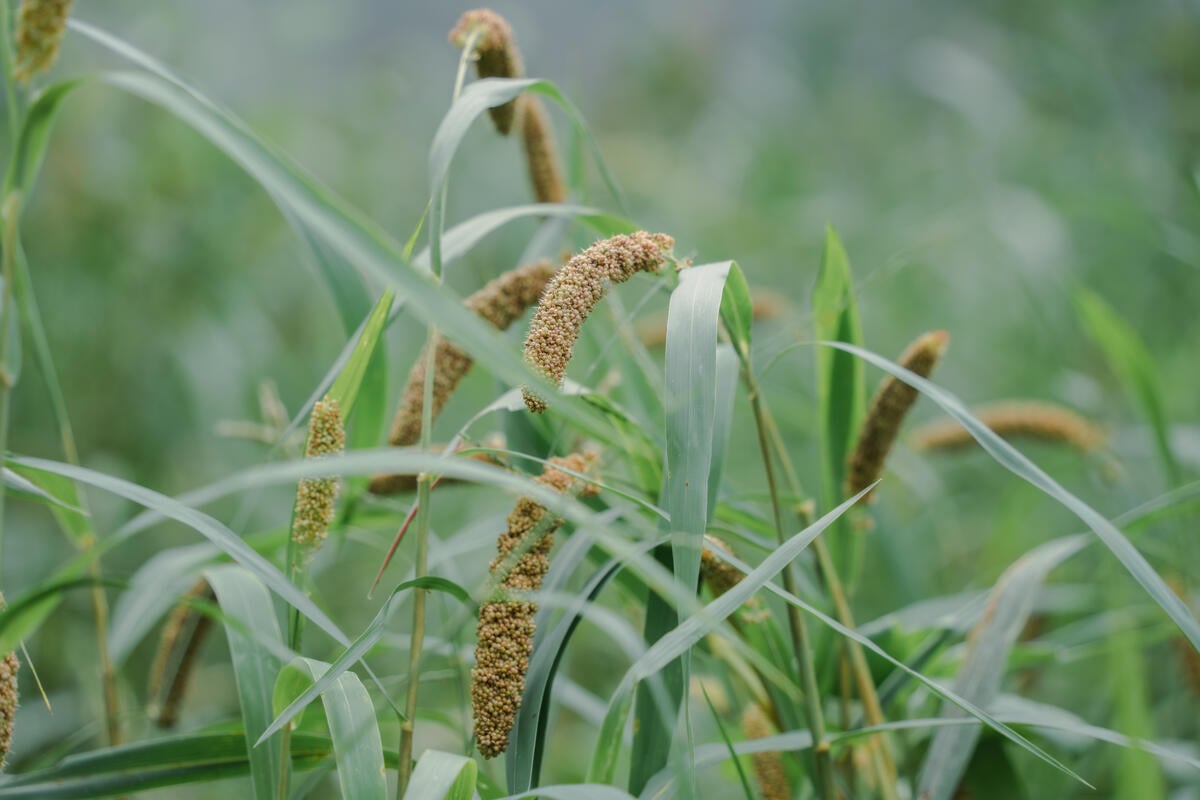Cheril Chiang, Bill Chou, Claudia Lim Nian Earn, and Coco Wu
Texte intégral (1481 mots)
Within Taiwan’s Indigenous communities, an environmental friendly tradition persists: in times of more extensive cultivation, farmers would plant extra millet, generously leaving a portion of the harvest for the birds. This seemingly small act of kindness is a vital lifeline for these fragile creatures.
However, as the shadow of climate change lengthens, extreme weather erodes farmlands, and rural populations dwindle, the once widespread golden millet fields are rapidly vanishing, taking with them the sparrows that once freely flitted through them. The intertwined fate of these species underscores a deeper truth: supporting Indigenous knowledge and ways of life is not only a matter of cultural preservation, but also a crucial step in safeguarding Taiwan’s biodiversity.

Once a common sight in Taiwan’s mountain villages, the Russet Sparrow now teeters on the brink of extinction, its numbers plummeting to a staggering low of under a thousand in the last two decades. Despite a slight recent recovery, the total population likely remains below 2,000, facing imminent disappearance from Taiwan’s lands. A combination of issues is converging, placing the sparrow at risk of endangerment.
- Rapid Loss of Habitat: Relentless deforestation and land development are steadily depriving the natural tree cavities where Russet Sparrows build their nests. These cavity-nesting birds are struggling to reproduce due to homelessness.
- The Impact of Climate Change: Taiwan’s millet fields, once essential for the Russet Sparrow, are now at risk due to rising temperatures and extreme weather, leading to the loss of farmlands and a decline in the birds’ food sources.
- The Harmful Effects of Pesticide: As Russet Sparrows forage in agricultural areas, they face growing exposure to harmful herbicides and pesticides, which directly threaten their survival and disrupt their food sources.
- The Decline of Millet Farming: Greenpeace’s data shows a troubling link between the sharp decrease in millet fields in Pingtung County and the rapid drop in Russet Sparrow populations. The loss of these fields represents not just a loss of food crops, but also a blow to biodiversity and Indigenous cultural traditions.
The millet fields of Taiwan’s Indigenous communities used to be vibrant ecosystems, where diverse wildlife thrived in harmony. Today, such abundant scenes have become exceedingly rare treasures in Taiwan’s natural landscape.

In Pingtung County’s Wutai, Sandimen, and Majia Townships, once strongholds of millet farming, production has plummeted by a staggering 93% in just over a decade, while farmland has shrunk by an equally devastating 94%. Adding to this tragedy, Indigenous farmers who recognize the gravity of the situation and are dedicated to reviving millet and protecting the land and its dependent wildlife often find themselves unable to access vital government payment of ecosystem services (PES). The current payment for ecosystem services payment scheme overlooks the crucial role of millet cultivation in maintaining biodiversity. This policy oversight fails to support these important ecosystem stewards and hinders the protection of biodiversity.
Small step for Project Successes, Continued Advocacy for Millet Farmers and Ecosystems
On Taiwan’s 2024 Indigenous Peoples Day, the dedicated volunteer team of Greenpeace’s Community Outreach Campaign (COC) joined hands with Indigenous community partners to deliver a heartfelt petition and handcrafted millet artwork to the government. Deputy Director-General Lin Haozhen of the Forestry and Nature Conservation Agency accepted this urgent plea from the grassroots, promising to consider Greenpeace’s policy recommendations and initiate active discussions and studies with relevant government agencies.

Greenpeace firmly believes that saving millet is synonymous with saving Taiwan’s biodiversity and protecting the very foundation of Indigenous cultures. We urgently call upon the Taiwanese government to:
- Integrate Indigenous traditional millet cultivation into national agricultural curricula, fostering the next generation of skilled farmers and ensuring the transmission of invaluable ancestral knowledge and techniques.
- Broaden the scope of PES, fully including Indigenous millet cultivation as an eligible practice, recognizing the vital contributions of these farmers in protecting the Russet Sparrow and its habitat, and incentivizing widespread adoption of environmentally friendly farming methods.
Each grain of millet carries the wisdom of generations; each millet field is a precious ecological oasis. Now is the time for decisive and impactful action. We must stand in solidarity with the Indigenous farmers on the frontlines of environmental protection in Taiwan, rescuing the endangered Russet Sparrow and safeguarding our shared home. This is not just about specific species or cultures; it is about ourselves, about the vibrant web of life that sustains Taiwan.
Cheril Chiang is a community outreach campaigner, Bill Chou is a content writer, Claudia Lim Nian Earn is an intern, and Coco Wu is a researcher – they are with Greenpeace East Asia, Taiwan
Greenpeace International
Texte intégral (1056 mots)
Amsterdam, Netherlands – The Inter-American Court of Human Rights just delivered a landmark decision on the obligations of States in the face of the climate emergency.[1] The Court established that governments must take “urgent and effective actions” to safeguard the right to a healthy climate, and that companies have obligations with regard to climate change and its impacts on human rights. This decision unequivocally puts the rights of people and nature above the interests of polluters.
In an unprecedented move, the Court also recognised the right to nature and ecosystems to maintain their essential ecological processes, as a crucial part in the effort to address the triple planetary crisis[2] and to achieve a truly sustainable development model that respects planetary boundaries and guarantees the rights of present and future generations.
Pablo Ramírez, Climate Campaigner, Greenpeace Mexico, said: “This is a life-changing decision for thousands of communities that are impacted by climate change on our continent. The highest court in the Americas is providing us with a pathway to climate justice, obliging States to guarantee human rights, address climate impacts and force polluting industries to repair the damage they have caused.”
The Court’s decision puts powerful legal tools to secure climate accountability and justice in the hands of more than 300 million people in 20 states that are party to the American Convention on Human Rights, including Indigenous Peoples, civil society organisations and individuals.
The advisory opinion was requested in January 2023 by the governments of Chile and Colombia.[3] It was followed by the most participatory process in the history of the Court, with 150 oral interventions from States, international organisations, Indigenous Peoples, and civil society, as well as 265 written submissions, including from Greenpeace International.
Latin America and the Caribbean are highly affected by air pollution[4], rising sea levels and extreme weather events[5], fuelled by emissions from oil and gas corporations and other polluting industries.[6]
The Court’s decision is grounded in clear scientific evidence that attributes large emissions from corporations to impacts such as loss of life and livelihoods from climate disasters. This Court decision will directly assist individuals and communities in pushing back against corporate polluters and corporate violations of human rights.
Maria Alejandra Serra, Legal Counsel, Greenpeace International, said: “For too long, politicians and corporations have gotten away with profiting from the destruction of our environment and from harming the lives of ordinary people. This decision marks the beginning of the era of corporate accountability and a big step towards dismantling the colonial legacy of systemic impunity in our region.”
The decision builds on the growing global momentum in courts tasked with interpreting international law facing the climate crisis.[7] It is expected to be used by governments to present more ambitious climate action plans and shape future decisions by other international human rights courts, setting the stage for a forthcoming historic advisory opinion from the International Court of Justice – the world’s highest court – on the responsibilities of States to mitigate climate impacts.
ENDS
Notes:
Photos and videos of Greenpeace International and its allies in the process at the Inter-American Court of Human Rights on the Greenpeace Media Library.
[1] The Inter-American Court of Human Rights, one of three regional human rights courts in the world, has the role to interpret and clarify the obligations of States. Its decisions inform national governments and courts. Read the full decision, Opinión Consultiva (in Spanish)
[2] As established by the United Nations, “[t]he triple planetary crisis refers to the interconnected challenges of climate change, pollution, and biodiversity loss”. What is the Triple Planetary Crisis
[4] A review on the impact of climate change and air pollution in the region, particularly in the Caribbean, is detailed in a Columbia University publication authored by Muge Akpinar-Elci and Olaniyi Olayinka.
[5] As recently as 2024, the Americas region faced devastating effects from multiple extreme weather events, which continued to impact lives, livelihoods, and food supply chains long after the events had passed, according to a publication by the World Meteorological Organization.
[6] Written observation on the request for an advisory opinion on the climate emergency and human rights by Greenpeace International, the Center for International Environmental Law, the NYU Climate Law Accelerator, the Union of Concerned Scientists, and the Open Society Justice Initiative.
[7] Some examples are the recent decisions from the International Tribunal for the Law of the Sea, which classified greenhouse gas emissions as marine pollution, and the ruling of the European Court of Human Rights against Switzerland, a State failing to set adequate climate targets.
Contacts:
Tal Harris, Greenpeace International, Global Media Lead – Stop Drilling Start Paying campaign, +41-782530550, tharris@greenpeace.org
Greenpeace International Press Desk, +31 (0) 20 718 2470 (available 24 hours), pressdesk.int@greenpeace.org
Greenpeace International
Lire plus (330 mots)
Sevilla, Spain – A growing coalition of countries have pledged to take action on taxing the super-rich and polluting companies at the 4th International Conference on Financing for Development conference.[1][2] But governments have failed to support bold measures to address the debt crisis that massively undermines Global South capacities to deal with social and environmental challenges and risks fuelling destructive extractive activities.
Fred Njehu, Global Political Lead at Greenpeace Africa, said: “Sevilla was a crucial moment for multilateralism, yet rich and powerful governments failed to match the urgency of the debt crisis hitting Global South countries, undermining wellbeing and climate action. A glimmer of hope is the new coalitions of countries that have pledged bold action to tax the super-rich and polluting corporations. These alliances are important for building momentum to unlock vital public finance beyond debt repayments.
“Now, world leaders must heed public anger over billionaire and fossil fuel greed. They must back transformative tax justice at the UN Tax Convention and COP30 to make super-rich individuals and powerful companies pay their fair share. They must listen to countries on the frontline, experts, and civil society activists throughout this conference calling for climate and tax justice.”
ENDS
Notes:
[1] Greenpeace welcomes new global initiative to advance tax reform on the super-rich
[2] New taxes on premium flyers and private jets: Greenpeace comment
Contacts:
Tal Harris, Global Media Lead – Stop Drilling Start Paying campaign, Greenpeace International. +41-782530550, tharris@greenpeace.org
Lee Kuen, Global Comms Lead – Fair Share campaign, Greenpeace International. +601112527489, lkuen@greenpeace.org
Greenpeace International Press Desk, +31 (0)20 718 2470 (available 24 hours), pressdesk.int@greenpeace.org
Bon Pote
Actu-Environnement
Amis de la Terre
Aspas
Biodiversité-sous-nos-pieds
Bloom
Canopée
Décroissance (la)
Deep Green Resistance
Déroute des routes
Faîte et Racines
Fracas
F.N.E (AURA)
Greenpeace Fr
JNE
La Relève et la Peste
La Terre
Le Lierre
Le Sauvage
Low-Tech Mag.
Motus & Langue pendue
Mountain Wilderness
Negawatt
Observatoire de l'Anthropocène
